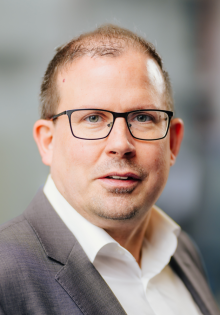On 11 July, Vice Chancellor and Economics Minister Robert Habeck visited the New Mobility Paderborn (NeMo) initiative, whose NeMo.bil project is receiving 17 million euros in funding from his ministry. During an expert discussion in Paderborn's town hall, it became clear that the NeMo.bil project has the potential to revolutionise mobility in rural areas. The NeMo initiative offers valuable approaches to make on-demand mobility in local public transport scalable.
NeMo focuses on the development and implementation of an electromobile, swarm-like mobility system that can supplement and revolutionise local public transport. Hubs are set up at central hubs as mobility-energy interfaces. Journeys are made individually as required and run without interruptions and without changing vehicles from the starting point to the destination. This makes individual public transport convenient and socially equitable. With regard to the central aspect of sustainability, the Paderborn region is ideally suited for pilot implementation because more renewable electricity is generated here than is consumed.
Automated, electrified small vehicles (cabs), which cover the first and last few miles, join together on longer routes to form a convoy, which is pulled by a larger automated electrically powered vehicle (Pro). The Cabs will weigh a maximum of 450 kilograms plus battery and offer space for up to four people. The Pros also serve as mobile e-charging stations, enabling longer ranges and higher speeds in the convoy. By combining the two vehicles, the overall system should achieve a previously unattainable level of energy efficiency.
The Department of Power Electronics and Electrical Drive Technology (LEA) at the Institute of Electrical Engineering (EIM-E) is responsible, among other things, for redesigning the charging lines of the Cab and Pro vehicles to create a new type of mobile, bidirectional charging system, which in particular also enables special charging scenarios during convoy journeys. This makes it possible to design the drive battery of the light cab vehicles to be extremely small and lightweight, as specific cabs can be recharged in a targeted manner during the joint overland journey. In addition, LEA is dedicated to optimising the electric drive of the vehicles, especially with regard to their specific usage profiles, such as the characteristic convoy journey.
In mid-July, an almost fully assembled cab (‘rolling chassis’) was delivered to LEA as the first prototype by project partner Inyo Mobility GmbH. This vehicle prototype, which will later have four seats and then drive autonomously, will serve as the basis and test vehicle for the redesign of the charging line towards a mobile, bidirectional charging system, among other things. Other on-board power electronics components will also be tested in practice and networked in advance (initially via CAN). Last but not least, two different electric drive systems will also be tested with this vehicle platform and the implementation of recuperation (recovery of electric braking energy) will be completed and optimised.
The expert discussion chaired by Minister Habeck was attended by Christoph Rüther (District Administrator of Paderborn, for local authorities and public transport authorities), Jonathan Behm (Neue Mobilität Paderborn e.V., Network for Mobility Ecosystems), Frank Köster (DLR, Data and Digitalisation Science), Marcus Zwick (INYO Mobility GmbH, consortium leader NeMo.bil, vehicle OEM), Mario Nowack (Leipziger Verkehrsbetriebe, project manager ABSOLUT, public transport operator), Michael Walther (Ministry for the Environment, Nature Conservation and Transport in NRW), Michael Dreier (Mayor of Paderborn), Norika Creuzmann (Member of the NRW State Parliament) and Stephan Melzer (msg systems AG, Data and Digitalisation Company). Ernst Stöckl-Pukall and Stefan Heidemann from the Federal Ministry for Economic Affairs and Climate Protection provided expert support.
Federal Minister Habeck: ‘It is a central task to enable mobility for everyone, including in rural areas, and thus to strengthen the equality of living conditions. Autonomous on-demand shuttles will be able to make an important contribution here. The New Mobility project is one of the most promising mobility initiatives in Germany. The aim now is to work together on solutions that can be quickly rolled out on a broad and supra-regional scale.’
(automatically translated)





